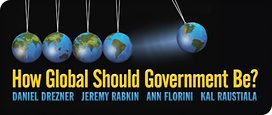Let me respond to two points made in recent posts. First, Ann’s argument that no one knows what China will become, and that China is undergoing dramatic political and social as well economic change, is surely correct. I have no great knowledge of China and am the first to admit it. My only point was that when it comes to the role and significance of global civil society, China’s current practices suggest a markedly different approach than that of the West. In assessing the future of global governance, therefore, we need to take that difference into account, even if China may shift its preferences over the long term.
Point two concerns international institutions. Earlier Dan wrote about a possible “Gresham’s law” of institutions. Gresham originally wrote about money, and posited that bad money — i.e., inflated or debased money — would drive out good money. Analogizing from this prediction, Dan suggests that the proliferation of global institutions leads to more “choice” for states and possibly to the debasing of the currency, as it were, of cooperation.
He is absolutely right to point to the proliferation of international institutions as an important and relatively understudied factor in world politics. In earlier work with David Victor of Stanford I noted this phenomenon, and we hypothesized about what such agglomerations of international treaty regimes (in our jargon, “regime complexes”) might mean for global cooperation.
One of our key arguments was that forum shopping would become much more important. States who did not like the rules promulgated in a particular forum — say, the WTO — could now more easily look to other venues to raise analogous issues. For instance, rules about trade in genetically-modified organisms exist in a host of UN and non-UN organizations. As a result the legal framework is uncertain, or at least inconsistent. In fact, we suggested that this inconsistency was often deliberate, and that some states used “strategic inconsistency” as a political maneuver. By creating conflicting legal rules these states could argue that they too were following international law and acting in a multilateral fashion. And they could take advantage of the propensity of international tribunals to look at international law holistically, in order to push tribunals toward compromise solutions in particular disputes.
The rising density of international institutions is certain to prove significant. The harder question, as Dan notes, is whether this trend will lead to a Gresham effect — in which global institutions increasingly weaken as a welter of rules drives out the good institutions and creates a legal morass — or whether we will see competition among international institutions leading to stronger and better rules: what economists might call a Tiebout effect.

